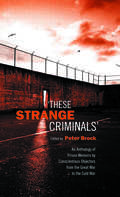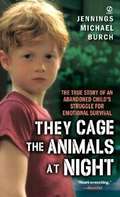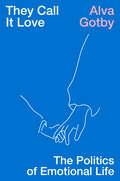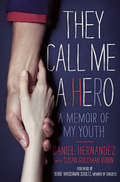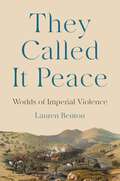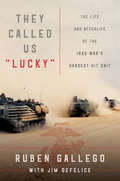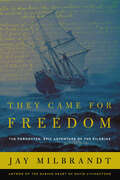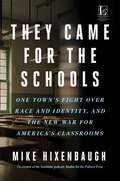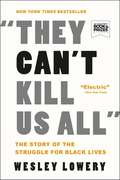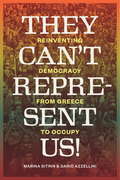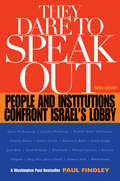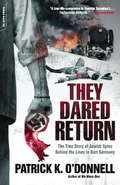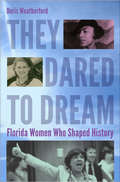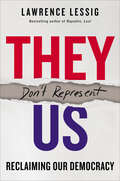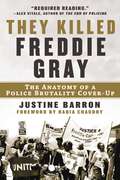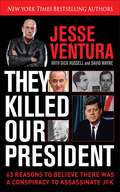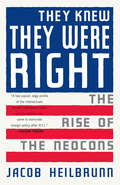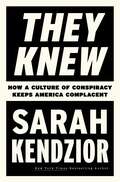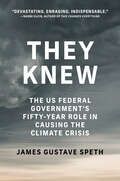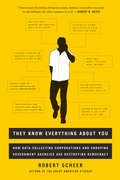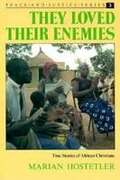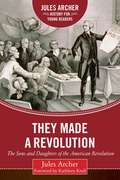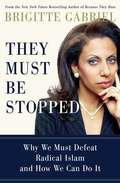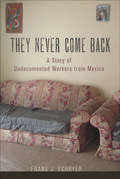- Table View
- List View
These Strange Criminals
by Peter BrockIn many modern wars, there have been those who have chosen not to fight. Be it for religious or moral reasons, some men and women have found no justification for breaking their conscientious objection to violence. In many cases, this objection has led to severe punishment at the hands of their own governments, usually lengthy prison terms. Peter Brock brings the voices of imprisoned conscientious objectors to the fore in These Strange Criminals.This important and thought-provoking anthology consists of thirty prison memoirs by conscientious objectors to military service, drawn from the United Kingdom, the United States, Canada, Australia, and New Zealand, and centring on their jail experiences either during the first or second world wars or in Cold War America. Voices from history - like those of Stephen Hobhouse, Dame Kathleen Lonsdale, Ian Hamilton, Alfred Hassler, and Donald Wetzel - come alive, detailing the impact of prison life and offering unique perspectives on wartime government policies of conscription and imprisonment. Sometimes intensely moving, and often inspiring, these memoirs show that in some cases, individual conscientious objectors - many well-educated and politically aware - sought to reform the penal system from within either by publicizing its dysfunction or through further resistance to authority. The collection is an essential contribution to our understanding of criminology and the history of pacifism, and represents a valuable addition to prison literature.
These Walls: The Battle for Rikers Island and the Future of America's Jails
by Eva Fedderly&“These Walls reframes the debate the country's incarceration crisis, with a compelling focus on architecture as a path forward.&” ?Tony Messenger, Pulitzer Prize-winning author of Profit and Punishment &“A critical intervention in the high stakes debate about the social value of jails and what we could do instead to create safety and justice." ?Alex Vitale, author of The End of PolicingFor nearly a century, the Rikers Island jail complex has stood on a 413-acre man-made island in the East River of New York. Today it is the largest correctional facility in the city, housing eight active jails and thousands of incarcerated individuals who have not yet been tried. It is also one of the most controversial and notorious jails in America. Which is why, when mayor Bill de Blasio announced in 2017 that Rikers would be closed within the next decade, replaced with four newly designed jails located within the city boroughs, the surface reaction seemed largely positive. Not only would Rikers, a long-standing symbol of the ills of mass incarceration, be decommissioned, but the buildings erected in its place would be the product of more enlightened views and outlooks. Many were enthusiastic, including Eva Fedderly, a journalist focused on the intersections of social justice and design, who was covering the closure and its impact for Architectural Digest. In a world of the rhetoric of talking heads and empty political promises, here, finally, was action. Breaking down the structures that enable an unjust system would surely mean its eventual eradication—change. Wasn&’t that a sign of progress? As Fedderly dug deeper and spoke to more people involved, however, she discovered that the consensus was hardly universal. Among architects at megafirms tasked with redesigns that reconcile profits and progress, the members of law enforcement working to stop incarceration cycles in community hot spots, the reformers and abolitionists calling for change, and, most wrenchingly, the incarcerated and formerly incarcerated individuals whose lives will be most affected, some agreed that closing Rikers was a step in the right direction, but many were quick to point out that Rikers was being replaced, not removed. There was frustration that the presence of new jails would disrupt neighborhoods, and that the city&’s resources should be invested in effective crime prevention and rehabilitation in communities to stop the incarceration cycle. On one point, however, there was firm agreement: whatever the outcome, the world would be watching. Part on-the-ground reporting, part deep social and architectural history, These Walls is an eye-opening look into how systems of inequity are constructed and a challenge to our long-held beliefs about what constitutes power and justice.
They Cage the Animals At Night: The True Story of a Child Who Learned to Survive
by Jennings Michael BurchAn autobiography of a boy who learned to reach out for love despite being left in an orphanage and growing up in many foster homes.
They Call It Love: The Politics of Emotional Life
by Alva GotbyThe work of love is a feminist problem, and it demands feminist solutions Comforting a family member or friend, soothing children, providing company for the elderly, ensuring that people feel well enough to work; this is all essential labour. Without it, capitalism would cease to function. They Call It Love investigates the work that makes a haven in a heartless world, examining who performs this labor, how it is organised, and how it might change. In this groundbreaking book, Alva Gotby calls this work &“emotional reproduction,&” unveiling its inherently political nature. It not only ensures people&’s well-being but creates sentimental attachments to social hierarchy and the status quo. Drawing on the thought of the feminist movement Wages for Housework, Gotby demonstrates that emotion is a key element of capitalist reproduction. To improve the way we relate to one another will require a radical restructuring of society.
They Call Me a Hero
by Susan Goldman Rubin Daniel HernandezDaniel Hernandez helped save the life of Congresswoman Gabrielle Giffords, and his life experience is a source of true inspiration in this heartfelt memoir."I don't consider myself a hero," says Daniel Hernandez. "I did what I thought anyone should have done. Heroes are people who spend a lifetime committed to helping others." When Daniel Hernandez was twenty years old, he was working as an intern for U.S. Representative Gabrielle Giffords. On January 8, 2011, during a "Congress on Your Corner" event, Giffords was shot. Daniel Hernandez's quick thinking saved Giffords's life until the paramedics arrived and took her to the hospital. Hernandez's bravery and heroism has been noted by many, including President Barack Obama. But while that may have been his most well-known moment in the spotlight, Daniel Hernandez, Jr., is a remarkable individual who has already accomplished much in his young life, and is working to achieve much more. This memoir explores Daniel's life, his character, and the traits that a young person needs to rise above adversity and become a hero like Daniel.
They Called It Peace: Worlds of Imperial Violence
by Lauren BentonA sweeping account of how small wars shaped global order in the age of empiresImperial conquest and colonization depended on pervasive raiding, slaving, and plunder. European empires amassed global power by asserting a right to use unilateral force at their discretion. They Called It Peace is a panoramic history of how these routines of violence remapped the contours of empire and reordered the world from the fifteenth to the twentieth centuries.In an account spanning from Asia to the Americas, Lauren Benton shows how imperial violence redefined the very nature of war and peace. Instead of preparing lasting peace, fragile truces ensured an easy return to war. Serial conflicts and armed interventions projected a de facto state of perpetual war across the globe. Benton describes how seemingly limited war sparked atrocities, from sudden massacres to long campaigns of dispossession and extermination. She brings vividly to life a world in which warmongers portrayed themselves as peacemakers and Europeans imagined &“small&” violence as essential to imperial rule and global order.Holding vital lessons for us today, They Called It Peace reveals how the imperial violence of the past has made perpetual war and the threat of atrocity endemic features of the international order.
They Called Us "Lucky": The Life and Afterlife of the Iraq War's Hardest Hit Unit
by Jim DeFelice Ruben GallegoFrom the Arizona Congressman, a "powerful" and "searing" (PW) chronicle of the eternal bonds forged between the Marines of Lima Company, the hardest-hit unit of the Iraq WarAt first, they were “Lucky Lima.” Infantryman Ruben Gallego and his brothers in Lima Company—3rd Battalion, 25th Marines, young men drawn from blue-collar towns, immigrant households, Navajo reservations—returned unscathed on patrol after patrol through the increasingly violent al Anbar region of Iraq, looking for weapons caches and insurgents trying to destabilize the nascent Iraqi government. After two months in Iraq, Lima didn't have a casualty, not a single Purple Heart, no injury worse than a blister. Lucky Lima.Then, in May 2005, Lima’s fortunes flipped. Unknown to Ruben and his fellow grunts, al Anbar had recently become a haven for al Qaeda in Mesopotamia. The bin Laden-sponsored group had recruited radicals from all over the world for jihad against the Americans. On one fateful day, they were lured into a death house; the ambush cost the lives of two men, including a platoon sergeant. Two days later, Ruben’s best friend, Jonathon Grant, died in an IED attack, along with several others. Events worsened from there. A disastrous operation in Haditha in August claimed the lives of thirteen Marines when an IED destroyed their amphibious vehicle. It was the worst single-day loss for the Marines since the 1983 Beirut bombings. By the time 3/25 went home in November, it had lost more men than any other single unit in the war. Forty-six Marines and two Navy Corpsmen serving with the battalion in Iraq were killed in action during their roughly nine-month activation.They Called Us “Lucky” details Ruben Gallego’s journey and includes harrowing accounts of some of the war’s most costly battles. It details the struggles and the successes of Ruben—now a member of Congress—and the rest of Lima Company following Iraq, examining the complicated matter of PTSD. And it serves as a tribute to Ruben’s fallen comrades, who made the ultimate sacrifice for their country. With its gripping accounts of some of the war's most costly battles, They Called Us 'Lucky' is a must-read for anyone interested in military history and the politics of war. It offers a firsthand perspective on the Iraq War and the struggles faced by soldiers like Ruben Gallego, who served in the hardest hit company of the hardest hit battalion of the war and occupation.
They Came for Freedom: The Forgotten, Epic Adventure of the Pilgrims
by Jay MilbrandtA page-turning story of the Pilgrims, the courageous band of freedom-seekers who set out for a new life for themselves and forever changed the course of history.Once a year at Thanksgiving, we encounter Pilgrims as folksy people in funny hats before promptly forgetting them. In the centuries since America began, the Pilgrims have been relegated to folklore and children&’s stories, fairy-tale mascots for holiday parties and greeting cards.The true story of the Pilgrim Fathers could not be more different. Beginning with the execution of two pastors deviating from the Elizabethan Church of England, the Pilgrims&’ great journey was one of courageous faith, daring escape, and tenuous survival. Theirs is the story of refugees who fled intense religious persecution; of dreamers who voyaged the Atlantic and into the unknown when all other attempts had led to near-certain death; of survivors who struggled with newfound freedom. Loneliness led to starvation, tension gave way to war with natives, and suspicion broke the back of the very freedom they endeavored to achieve.Despite the pain and turmoil of this high stakes triumph, the Pilgrim Fathers built the cornerstone for a nation dedicated to faith, freedom, and thankfulness. This is the epic story of the Pilgrims, an adventure that laid the bedrock for the Founding Fathers, the Constitution, and the American identity.
They Came for the Schools: One Town's Fight Over Race and Identity, and the New War for America's Classrooms
by Mike HixenbaughNATIONAL BESTSELLERThe urgent, revelatory story of how a school board win for the conservative right in one Texas suburb inspired a Christian nationalist campaign now threatening to undermine public education in America—from an NBC investigative reporter and co-creator of the Peabody Award–winning and Pulitzer Prize finalist Southlake podcast. Award-winning journalist Mike Hixenbaugh delivers the immersive and eye-opening story of Southlake, Texas, a district that seemed to offer everything parents would want for their children—small classes, dedicated teachers, financial resources, a track record of academic success, and school spirit in abundance. All this, until a series of racist incidents became public, a plan to promote inclusiveness was proposed in response—and a coordinated, well-funded conservative backlash erupted, lighting the fire of a national movement on the verge of changing the face of public schools across the country.They Came for the Schools pulls back the curtain on the powerful forces driving this crusade to ban books, rewrite curricula, limit rights for minority and LGBTQ students—and, most importantly, to win what Hixenbaugh’s deeply informed reporting convinces is the holy grail among those seeking to impose biblical values on American society: school privatization, one school board and one legal battle at a time.They Came for the Schools delivers an essential take on Donald Trump and Ron DeSantis, as they demean public schools and teachers and boost the Christian right’s vision. Hixenbaugh brings to light fascinating connections between this political and cultural moment and past fundamentalist campaigns to censor classroom lessons. Finally, They Came for the Schools traces the rise of a new resistance movement led by a diverse coalition of student activists, fed-up educators, and parents who are beginning to win select battles of their own: a blueprint, they hope, for gaining inclusive and civil schools for all.
They Can't Kill Us All: Ferguson, Baltimore, and a New Era in America's Racial Justice Movement
by Wesley LoweryOne of the Most Anticipated Books of Fall 2016 -- Publishers WeeklyOne of the Most Anticipated Books of Fall 2016--Elle11 Fall Books We Can't Wait to Read -- Seattle TimesA best book of fall 2016--Boston GlobeOne of the St. Louis Post-Dispatch's 20 Books to Watch, fall 2016One of Vulture's "7 Books You Need to Read this November"A deeply reported book that brings alive the quest for justice in the deaths of Michael Brown, Tamir Rice, and Freddie Gray, offering both unparalleled insight into the reality of police violence in America and an intimate, moving portrait of those working to end itConducting hundreds of interviews during the course of over one year reporting on the ground, Washington Post writer Wesley Lowery traveled from Ferguson, Missouri, to Cleveland, Ohio; Charleston, South Carolina; and Baltimore, Maryland; and then back to Ferguson to uncover life inside the most heavily policed, if otherwise neglected, corners of America today.In an effort to grasp the magnitude of the repose to Michael Brown's death and understand the scale of the problem police violence represents, Lowery speaks to Brown's family and the families of other victims other victims' families as well as local activists. By posing the question, "What does the loss of any one life mean to the rest of the nation?" Lowery examines the cumulative effect of decades of racially biased policing in segregated neighborhoods with failing schools, crumbling infrastructure and too few jobs.Studded with moments of joy, and tragedy, They Can't Kill Us All offers a historically informed look at the standoff between the police and those they are sworn to protect, showing that civil unrest is just one tool of resistance in the broader struggle for justice. As Lowery brings vividly to life, the protests against police killings are also about the black community's long history on the receiving end of perceived and actual acts of injustice and discrimination. They Can't Kill Us All grapples with a persistent if also largely unexamined aspect of the otherwise transformative presidency of Barack Obama: the failure to deliver tangible security and opportunity to those Americans most in need of both.
They Can't Represent Us!
by David Harvey Dario Azzellini Marina SitrinMass protest movements in disparate places such as Greece, Argentina, and the United States ultimately share an agenda--to raise the question of what democracy should mean. These horizontalist movements, including Occupy, exercise and claim participatory democracy as the ground of revolutionary social change today. Written by two international activist intellectuals and based on extensive interviews with movement participants in Spain, Venezuela, Argentina, across the United States, and elsewhere, this book is an expansive portrait of the assemblies, direct democracy forums, and organizational forms championed by the new movements, as well as an analytical history of direct and participatory democracy from ancient Athens to Zuccotti Park. The new movements put forward the idea that liberal democracy is not democratic, nor was it ever.From the Trade Paperback edition.championed by the new movements, and its truly global focus provides a kind of political travelogue of the cutting edge of global activism.
They Dare to Speak Out: People and Institutions Confront Israel's Lobby
by Paul FindleyThe first book to speak out against the pervasive influence of the American-Israeli Public Affairs Committee (AIPAC) on American politics, policy, and institutions resonates today as never before. With careful documentation and specific case histories, former congressman Paul Findley demonstrates how the Israel lobby helps to shape important aspects of U.S. foreign policy and influences congressional, senatorial, and even presidential elections. Described are the undue influence AIPAC exerts in the Senate and the House and the pressure AIPAC brings to bear on university professors and journalists who seem too sympathetic to Arab and Islamic states and too critical of Israel and its policies. Along with many longtime outspoken critics, new voices speaking out include former President Jimmy Carter, U.S. Representative Cynthia McKinney, Senator Robert Byrd, prominent Arab-American Dr. Ziad Asali, Rabbi Michael Lerner, and journalist Charles Reese. In addition, the lack of open debate among politicians with regard to the U.S. policy in the Middle East is lamented, and AIPAC is blamed in part for this censorship. Connections are drawn between America's unconditional support of Israel and the raging anti-American passions around the world--and ultimately the tragic events of 9/11. This replaces 1556520735.
They Dared Return: The True Story of Jewish Spies Behind the Lines in Nazi Germany
by O'Donnell Patrick K.At the height of World War II, with the Third Reich’s final solution in full operation, a small group of Jews who had barely escaped the Nazis did the unthinkable: They went back. Spies now, these men took on a dangerous mission behind enemy lines. They Dared Return is their story-a tale of adventure, espionage, love, and revenge.
They Dared to Dream: Florida Women Who Shaped History
by Doris Weatherford"Well-crafted and in-depth, They Dared to Dream has moved women, their experiences, and their contributions to the forefront of Florida's history and heritage. This is a long-overdue and much-needed turning point in understanding our state's past and present."--Canter Brown Jr., coeditor of The Varieties of Women's Experiences "Represents a leap forward in the study of Florida history. Weatherford has done an outstanding job of researching and writing about Florida women, from paupers to queens, elevating their status to a level of equality within the overall story of Florida."--Rodney Kite-Powell, Saunders Foundation Curator of History at the Tampa Bay History Center and editor of Tampa Bay History "Exhaustively researched, well written, and engaging, They Dared to Dream breaks new ground in the study of Florida. Doris Weatherford's ambitious history of women in Florida will be widely read and discussed. From Princess Ulele to Alex Sink, from the role of criollas in Colonial St. Augustine to the struggles of women in the twenty-first century, Weatherford chronicles their lives in the Sunshine State."--Gary Mormino, author of Land of Sunshine, State of Dreams In this extensive portrayal of Florida's guiding matriarchs, Doris Weatherford highlights the myriad contributions women have made throughout Florida's history. From the select few who traveled with Ponce de Leon to the state's first female mayor Marion H. O’Brien, Weatherford sheds light on the roles these pioneering women played in the shaping of the Sunshine State. They Dared to Dream reveals the lifestyles and achievements of women throughout landmark moments in history, including Native civilizations before the arrival of European colonists; early Spanish, British, and French exploration, the Civil War era, Reconstruction, the early twentieth century, and the population explosions post-World War II. Featuring often-celebrated personalities--including Mary Martha Reid, Harriet Beecher Stowe, and Elizabeth Cady Stanton--alongside the lesser-known lives of Princess Murat, lighthouse keeper Barbara Mabrity, Florida Memorial College founder Sarah Ann Blocker, and others--this pivotal examination of Florida's female agents of change draws attention to women's instrumental roles in the historical events that defined the Sunshine State. From prehistoric times to the space age, the female half of the population has made giant, but too often unacknowledged, contributions to Florida history. Countless women have overcome great obstacles and yet are often left out of historical accounts. They Dared to Dream aims to fill in some of these gaps by celebrating the many successes women have made. Because without women, there is no history--nor any future. Doris Weatherford is the author of A History of the American Suffragist Movement and other reference guides on American women’s history. The Florida Commission on the Status of Women Foundation, Inc., is dedicated to empowering women and girls in our state by supporting educational, entrepreneurial and self sufficiency programs and initiatives through grants, mentoring, and other opportunities. The FCSW Foundation supports the work and programs of the Florida Commission on the Status of Women, including the Florida Women's Hall of Fame. The Florida Commission on the Status of Women Foundation, Inc. dedicates this book to: the women of the past who struggled to achieve gender equality and showed the path, the women of the present who continue with the same goal, and the women of the future who will carry the baton and make us proud.--Dr. Mona Jain Acknowledgments, by the Florida Commission on the Status of Women Foundation, Inc The Florida women’s history book project could not have been completed without the cooperation and support of many people. To thank all of them who made it possible would be nearly impossible. We would, however, like to express our sincere appreciation to those who have helped take this endeavor "from dream to reality." First and foremost, we are indebted forever t
They Don't Represent Us: Reclaiming Our Democracy
by Lawrence LessigWITH A NEW FOREWORD ABOUT THE 2020 ELECTION“This urgent book offers not only a clear-eyed explanation of the forces that broke our politics, but a thoughtful and, yes, patriotic vision of how we create a government that’s truly by and for the people.”—DAVID DALEY, bestselling author of Ratf**ked and UnriggedIn the vein of On Tyranny and How Democracies Die, the bestselling author of Republic, Lost argues with insight and urgency that our democracy no longer represents us and shows that reform is both necessary and possible.America’s democracy is in crisis. Along many dimensions, a single flaw—unrepresentativeness—has detached our government from the people. And as a people, our fractured partisanship and ignorance on critical issues drive our leaders to stake out ever more extreme positions. In They Don’t Represent Us, Harvard law professor Lawrence Lessig charts the way in which the fundamental institutions of our democracy, including our media, respond to narrow interests rather than to the needs and wishes of the nation’s citizenry. But the blame does not only lie with “them”—Washington’s politicians and power brokers, Lessig argues. The problem is also “us.” “We the people” are increasingly uninformed about the issues, while ubiquitous political polling exacerbates the problem, reflecting and normalizing our ignorance and feeding it back into the system as representative of our will.What we need, Lessig contends, is a series of reforms, from governmental institutions to the public itself, including:A move immediately to public campaign funding, leading to more representative candidatesA reformed Electoral College, that gives the President a reason to represent America as a wholeA federal standard to end partisan gerrymandering in the states A radically reformed SenateA federal penalty on states that don’t secure to their people an equal freedom to voteInstitutions that empower the people to speak in an informed and deliberative wayA soul-searching and incisive examination of our failing political culture, this nonpartisan call to arms speaks to every citizen, offering a far-reaching platform for reform that could save our democracy and make it work for all of us.
They Killed Freddie Gray: The Anatomy of a Police Brutality Cover-Up
by Justine BarronBased on new evidence and deep reporting, the riveting truth about a case that has become a touchstone in the struggle for racial justice and Black lives.They Killed Freddie Gray exposes a conspiracy among Baltimore leaders to cover up what actually happened to Freddie Gray, who was fatally injured in police custody in April 2015. After Gray&’s death, Baltimore became ground zero for Black Lives Matter and racial justice protests that exploded across the country. State&’s Attorney Marilyn Mosby became a hero when she charged six officers in Gray&’s death, and the trials of the officers generated national headlines for two years. Yet the cause of Gray&’s death has remained a mystery. A viral video showed an officer leaning on Gray&’s back while he cried out in pain. But the autopsy concluded he was fatally injured later that morning while the van was in motion—during a multi-stop &“rough ride&”—from sudden impact to his head. None of the officers were convicted of any crimes based on this theory. They Killed Freddie Gray solves the mystery of Gray&’s death by uncovering new evidence of how he was killed by police and how his cause of death was covered up. In coordination with a documentary film now being produced, this book revisits a pivotal moment in US criminal justice history, providing new insight into what happened, the historical structures of power that allowed it to happen, and the personalities and dynamics involved—a story never told by the mainstream media. It includes a detailed map with annotations by the author, photographs, and a foreword by Rabia Chaudry.
They Killed Our President: 63 Reasons to Believe There Was a Conspiracy to Assassinate JFK
by Jesse Ventura Dick Russell David WayneUnless you've been living under a rock for the past fifty years, you're aware of the many hypotheses that the assassination of President John F. Kennedy was not done by one man. Whether you've read one or a dozen of the books on this topic, there's no way to fully grasp the depth of this conspiracy. For the first time ever, New York Times bestselling authors Jesse Ventura and Dick Russell have teamed up with some of the most respected and influential assassination researchers to put together the ultimate compendium that covers every angle--from the plot to the murder--of JFK. They Killed Our President will not only discuss the most famous of theories, but will also bring to light new and recently discovered information, which together shows that the United States government not only was behind this egregious plot, but took every step to make sure that the truth would not come out.With 2013 marking the fiftieth anniversary of JFK's assassination, this is the perfect time for They Killed Our President to be available to readers. The research and information in this book are unprecedented, and there's nobody better to bring this to everyone's attention than the former governor of Minnesota and US Navy SEAL, Jesse Ventura.
They Knew They Were Right: The Rise of the Neocons
by Jacob HeilbrunnThe neocons have become at once the most feared and reviled intellectual movement in American history. Critics on left and right describe them as a tight-knit cabal that ensnared the Bush administration in an unwinnable foreign war. Who are the neoconservatives? How did an obscure band of policy intellectuals, left for dead in the 1990s, suddenly rise to influence the Bush administration and revolutionize American foreign policy? Jacob Heilbrunn wittily and pungently depicts the government officials, pundits, and think-tank denizens who make up this controversial movement, bringing them to life against a background rich in historical detail and political insight. Setting the movement in the larger context of the decades-long battle between liberals and conservatives, first over communism, now over the war on terrorism, he shows that they have always been intellectual mavericks, with a fiery prophetic temperament (and a rhetoric to match) that sets them apart from both liberals and traditional conservatives. Neoconservatism grew out of a split in the 1930s between Stalinists and followers of Trotsky. These obscure ideological battles between warring Marxist factions were transported to the larger canvas of the Cold War, as over time the neocons moved steadily to the right, abandoning the Democratic party after 1972 when it shunned intervention abroad, and completing their journey in 1980 when they embraced Ronald Reagan and the Republican party. There they supplied the ideological glue that held the Reagan coalition together, combining the agenda of “family values” with a crusading foreign policy. Out of favor with the first President Bush, and reduced to gadflies in the Clinton years, they suddenly found themselves in George W. Bush’s administration in a position of unprecendented influence. For the first time in their long history, they had their hands on the levers of power. Prompted by 9/11, they used that power to advance what they believed to be America’s strategic interest in spreading democracy throughout the Arab world. Their critics charge that the neo-conservatives were doing the bidding of the Israeli government -- a charge that the neoconservatives rightfully reject. But Heilbrunn shows that the story of the neocons is inseparable from the great historical drama of Jewish assimilation. Decisively shaped by the immigrant exerience and the trauma of the Holocaust, they rose from the margins of political life to become an insurgent counter-establishment that challenged the old WASP foreign policy elite. Far from being chastened by the Iraq debacle, the neocons continue to guide foreign policy. They are advisors to each of the major GOP presidential candidates. Repeatedly declared dead in the past, like Old Testament prophets they thrive on adversity. This book shows where they came from -- and why they remain a potent and permanent force in American politics. From the Hardcover edition.
They Knew: How a Culture of Conspiracy Keeps America Complacent
by Sarah KendziorFINALIST FOR THE LOS ANGELES TIMES BOOK PRIZE “Every sentence delivered. The pathos of truth-seeking left me thinking of Herman Melville."—Timothy Snyder, #1 New York Times bestselling author of On TyrannyNEW YORK TIMES BESTSELLING author Sarah Kendzior delves into the difference between conspiracy and conspiracy theory, "deftly separat[ing] fact from fiction in a conspiracy-addled nation" (VANITY FAIR).Conspiracy theories are on the rise because officials refuse to enforce accountability for real conspiracies. Uncritical faith in broken institutions is as dangerous as false narratives peddled by propagandists.The truth may hurt—but the lies will kill us.They Knew discusses conspiracy culture in a rapidly declining United States struggling with corruption, climate change, and other crises. As the actions of the powerful remain shrouded in mystery—“From Norman Baker to Jeffrey Epstein, Iran-Contra to January 6" (VF)—it is unsurprising that people turn to conspiracy theories to fill the informational void. They Knew exposes the tactics these powerful actors use to placate an inquisitive public.Here, for the first time, Kendzior blends her signature whip-smart prose and eviscerating arguments with lyrical and intimate examinations of the times and places that haunt American history. "America is a ghost story," writes Kendzior, as she unearths decades of buried history, providing an essential and critical look at how to rebuild our democracy by confronting the political lies and crimes that have shaped us.
They Knew: The US Federal Governments Fifty-Year Role in Causing the Climate Crisis
by James Gustave SpethA devastating, play-by-play account of the federal government's leading role in bringing about today's climate crisis.In 2015, a group of twenty-one young people sued the federal government for violating their constitutional rights by promoting the climate catastrophe, depriving them of life, liberty, and property without due process of law. They Knew offers evidence for their claims, presenting a devastating, play-by-play account of the federal government's role in bringing about today's climate crisis. James Speth, tapped by the plaintiffs as an expert on climate, documents how administrations from Carter to Trump--despite having information about climate change and the connection to fossil fuels--continued aggressive support of a fossil fuel based energy system. What did the federal government know and when did it know it? Speth asks, echoing another famous cover up. What did the federal government do and what did it not do? They Knew (an updated version of the Expert Report Speth prepared for the lawsuit) presents the most compelling indictment yet of the government's role in the climate crisis, showing a forty-year failure to take action. Since Juliana v. United States was filed, the federal government has repeatedly delayed the case. Yet even in legal limbo, it has helped inspire a generation of youthful climate activists. An Our Children&’s Trust Book
They Know Everything About You: How Data-Collecting Corporations and Snooping Government Agencies Are Destroying Democracy
by Robert Scheer Sara BeladiThey Know Everything About You is a groundbreaking exposé of how government agencies and tech corporations monitor virtually every aspect of our lives, and a fierce defense of privacy and democracy. The revelation that the government has access to a vast trove of personal online data demonstrates that we already live in a surveillance society. But the erosion of privacy rights extends far beyond big government. Intelligence agencies such as the NSA and CIA are using Silicon Valley corporate partners as their data spies. Seemingly progressive tech companies are joining forces with snooping government agencies to create a brave new world of wired tyranny. Life in the digital age poses an unprecedented challenge to our constitutional liberties, which guarantee a wall of privacy between the individual and the government. The basic assumption of democracy requires the ability of the individual to experiment with ideas and associations within a protected zone, as secured by the Constitution. The unobserved moment embodies the most basic of human rights, yet it is being squandered in the name of national security and consumer convenience. Robert Scheer argues that the information revolution, while a source of public enlightenment, contains the seeds of freedom’s destruction in the form of a surveillance state that exceeds the wildest dream of the most ingenious dictator. The technology of surveillance, unless vigorously resisted, represents an existential threat to the liberation of the human spirit.
They Loved Their Enemies: True Stories of African Christians
by Marian HostetlerMarian Hostetler tells the stories of many kinds of people -- young and old, male and female, leaders and ordinary folk. There are stories of people from 1,700 years ago and those from recent years. The stories come from across the continent of Africa, from Algeria to South Africa, from Sierra Leone to Kenya. Volume 3.
They Made a Revolution: The Sons and Daughters of the American Revolution (Jules Archer History for Young Readers)
by Kathleen Krull Jules ArcherThe founding fathers and mothers of the United States were not, as history often makes them out to be, stuffy cardboard figures of virtue and nobility. They Made a Revolution introduces them as the real people they were-complete with their inevitable flaws and weaknesses. Through their letters, diaries, and reminiscences, discover what was going on in the minds of this country’s revolutionary leaders as they committed treason against the most powerful nation on earth, risking their lives for the sake of freedom. Meet "The Sly Fox,” Sam Adams; "The Rich Rebel,” John Hancock; "The Silver-Tongued Bumpkin,” Patrick Henry; and the very brave Abigail Adams and full-of-secrets Martha Washington. Each of these characters comes alive in this fabulous collection of historical biographies.These are the stories of the courageous men and women who stood up to the British king and made a revolution happen. To England, they were traitors. To the United States, they became patriots.
They Must Be Stopped: Why We Must Defeat Radical Islam and How We Can Do It
by Brigitte GabrielThey Must Be Stopped is New York Times bestselling author Brigitte Gabriel's warning to the world: We can no longer ignore the growth of radical Islam--we must act soon, and powerfully. Gabriel challenges our western and politically-correct notions about Islam, demonstrating why radical Islam is so deadly and how we can halt its progress. Brigitte Gabriel speaks her mind:* Fundamentalist Islam is a religion rooted in 7th century teachings that are fundamentally opposed to democracy and equality.* Radical Islamists are utterly contemptuous of all infidels (non-Muslims) and regard them as enemies worthy of death.* Madrassas in America are increasing in number, and they are just one part of a growing radical Islamic army on US soil.* Radical Islam exploits the US legal system and America's protection of religion to spread its hatred for western values.* America must organize a unified voice that says 'enough to political correctness, and demands that government officials and elected representatives do whatever is necessary to protect us. Brigitte Gabriel has fearlessly faced down critics, death threats, and political correctness, and is one of the most sought after terrorism experts in the world. They Must Be Stopped is her clarion call to action. Gabriel thoroughly addresses the historical and religious basis of radical Islam, its frightening encroachment into societies around the world, and its abuses of democracy in the name of religion.
They Never Come Back: A Story of Undocumented Workers from Mexico
by Frans J. SchryerFor Mexicans on both sides of the border, the migrant experience has changed significantly over the past two decades. In They Never Come Back, Frans J. Schryer draws on the experiences of indigenous people from a region in the Mexican state of Guerrero to explore the impact of this transformation on the lives of migrants. When handicraft production was able to provide a viable alternative to agricultural labor, most migrants would travel to other parts of Mexico to sell their wares. Others opted to work for wages in the United States, returning to Mexico on a regular basis. This is no longer the case. At first almost everyone, including former craft vendors, headed north; however it also became more difficult to go back home and then reenter the United States. One migrant quoted by Schryer laments, "Before I was an artisan and free to travel all over Mexico to sell my crafts. Here we are all locked in a box and cannot get out." NAFTA, migrant labor legislation, and more stringent border controls have all affected migrants' home communities, their relations with employers, their livelihoods, and their identity and customs. Schryer traces the personal lives and careers of indigenous men and women on both sides of the border. He finds that the most pressing issue facing undocumented workers is not that they are unable to earn enough money but, rather, that they are living in a state of ongoing uncertainty and will never be able to achieve their full potential. Through these stories, Schryer offers a nuanced understanding of the predicaments undocumented workers face and the importance of the ongoing debate around immigration policy.
